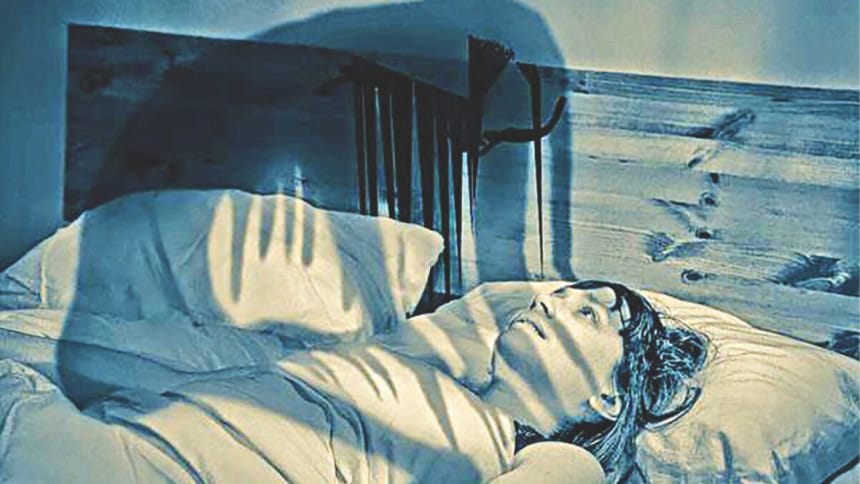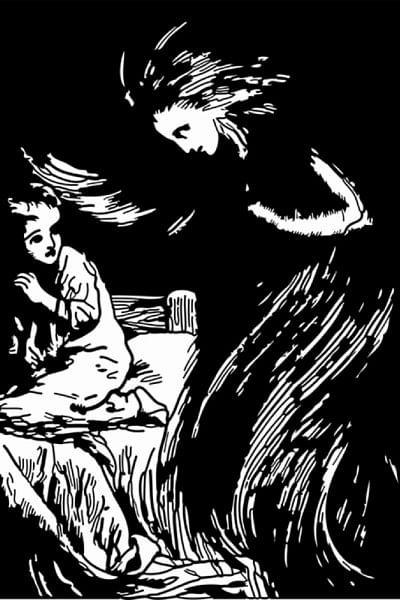How to deal with night terrors

Night terrors, as the name suggests, are parasomnic instances when your body experiences an overwhelming sense of vulnerability, with magnified senses of fear and terror. More common in children from the age of 6-12, it occurs in young adults often due to underlying conditions such as anxiety, stress or the occurance of a traumatic event.
"To me, night terrors are episodes where people can experience first hand what it feels like to be truly vulnerable and helpless in the face of danger. It's like all your defence mechanisms are lit at once but you're paralysed so you can't do anything about it," said Nazifa Raida. Adults usually respond to such occurences with rapid body movements which often have high chances of turning violent while others cope by walking in their sleep. Loud screaming is another common response.
Night terror distinguishes itself from nightmares primarily by its far more realistic nature. The fabricated reality of this almost always succeeds in convincing the sufferers of the scenario being true. Other than that, people usually wake up from nightmares voluntarily whereas night terrors occur when you're half asleep and thus trapped inside your body, leaving you with the inability to move.
Although night terrors can't be prevented completely, its frequency can however be decreased. "I remember feeling like I was in danger and needed to protect myself. With a racing heart, I started saying my prayers. I also looked around for things that felt off," said Sheersho Zaman, an undergrad student, when asked about how he dealt with his most recent episode. Even though it's easier said than done, panicking doesn't do any good in such situations so learning how to remain calm makes a big difference. Moreover, searching for things in odd places in the dreams helps in convincing yourself of its fabricated nature. "I remember my older sibling telling me about his similar experiences, and knowing that there were other people who dealt with this, somehow calmed me down. So I guess reaching out to people and talking about it helps a lot," he added.
While staying calm isn't something that can be easily switched on, there's a trick that a friend of mine suggested. While watching horror movies, she takes note of the borders of the screen and uses it as a boundary which signifies that beyond this rectangular space is the real world to keep things in perspective. Similarly, implementing this very technique while experiencing night terrors may help calm yourself down more easily as you will then use logic to make an effort to differentiate between fiction and reality. The sooner you learn to convince yourself of its falsehood, the better.

As the usual causes of such incidences in adults are bad sleep habits or exhaustion, it is necessary for people – especially those who have experienced night terrors – to have atleast a whole 6 hours of sleep in a day. While sleep cycles can't possibly be fixed overnight, practicing to sleep in a timely manner contributes greatly to the likelihood of it getting fixed,be it over multiple attempts. To make the process faster, you may try practicing falling asleep at a specific time each day and slowly increasing your sleeping hours as the days go by. Moreover, maintaining a monotonous routine before going to sleep every night and exercising also lead to better chances of falling asleep in a routined manner.
Lastly, night terrors may arise with the occurrence of a deeply traumatic incident. In such cases, it is usually advised to reach out to people, especially your loved ones, and share your experiences regardless of its magnitude. However, if push comes to shove, it's always a good option to seek professional help. "After getting dismissed several times, I never told anyone again. Now it's almost like I have gotten used to it. The hurdles which I had to go through to reach this level of acceptance was extraordinary so I seek to reach out to people dealing with similar issues every now and then," says Shadman Wahid Sachin, a first-year student at IBA, Dhaka University.
Although no specified treatment has yet been proven to stop night terrors from occuring, implementing a few of the aforementioned techniques may help cope with it better. Moreover, other steps such as limiting caffeine intake, anticipatory awakening of the person about 15 minutes before he/she experiences sleep terrors and medication may help. In terms of underlying factors, it is advised to tackle the root cause itself, and if stress and anxiety are contributing factors, then it is better to take those issues into consideration and take actions accordingly.
Veronica Gomes is a devout Coldplayer and Sherlockian who is convinced her dog has secret pet parties at her place when she's not around. Email her at [email protected]

 For all latest news, follow The Daily Star's Google News channel.
For all latest news, follow The Daily Star's Google News channel. 



Comments